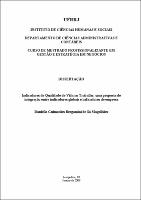Use este identificador para citar ou linkar para este item:
http://rima.ufrrj.br/jspui/handle/20.500.14407/15128| Tipo do documento: | Dissertação |
| Título: | Indicadores de qualidade de vida no trabalho: uma proposta de integração entre indicadores globais e os indicadores de empresa |
| Título(s) alternativo(s): | Work life quality indicators: a proposition of integration between the global and the industrial company indicators |
| Autor(es): | Magalhães, Daniella Guimarães Bergamini de Sá |
| Orientador(a): | Boas, Ana Alice Vilas |
| Palavras-chave: | human resources administration;motivation;perception and commitment;gestão de pessoas;motivação;percepção e comprometimento |
| Área(s) do CNPq: | Administração |
| Idioma: | por |
| Data do documento: | 27-jan-2006 |
| Editor: | Universidade Federal Rural do Rio de Janeiro |
| Sigla da instituição: | UFRRJ |
| Departamento: | Instituto de Ciências Humanas e Sociais |
| Programa: | Programa de Pós-Graduação em Gestão e Estratégia |
| Citação: | MAGALHÃES, Daniella Guimarães Bergamini de Sá. Indicadores de qualidade de vida no trabalho: uma proposta de integração entre indicadores globais e os indicadores de empresa. 2006. 91 f. Dissertação (Mestrado Profissional em Gestão e Estratégia) - Instituto de Ciências Humanas e Sociais, Universidade Federal Rural do Rio de Janeiro, Seropédica - RJ, 2006. |
| Resumo: | Este trabalho procurou verificar a possibilidade da integração entre os indicadores globais de Qualidade de Vida, desenvolvidos para um país, e os modelos de Programas de Qualidade de Vida no Trabalho já existentes. O estudo inicia descrevendo como aconteceu a evolução do conceito de QVT, a ponto de se perceber que a satisfação deveria ser incorporada ao ambiente de trabalho, com o intuito de incrementar a produtividade e promover o bem-estar social. A partir de um diagnóstico dos Recursos Humanos, para se analisar como está o ambiente de trabalho. A partir disto, utilizou-se uma pesquisa descritiva com uma amostra de duas empresas do Estado Rio de Janeiro. Baseado na pesquisa de campo, feita através de questionário pôde-se verificar a importância da identificação dos principais indicadores para se adotar um Programa de QVT. Com base nos resultados sugere-se que a proposta seja composta dos seguintes Indicadores: aperfeiçoamento, educação, emprego, ambiente físico e mental, saúde, direitos humanos, renda/salário e recreação. Através da pesquisa, verificou-se a importância de se adotar um Programa de Qualidade de Vida do Trabalho adequado não só às necessidades da empresa, mas também à satisfação dos funcionários, em termos pessoais, sociais, econômicos e profissionais. |
| Abstract: | This work aimed at verifying the possibility of the integration between the global indicators of life quality, and the models of the work life quality (WLQ) Programs, already developed for a country, The study begins by describing how the concept of WLQ has evolved to the extent of considering that the human resources satisfaction should be also incorporated into the work environment. The intention was to increase the productivity and to promote the social well-being. Initially, the study raised a diagnosis about the actual work environment. Then, data have been collected, through questionnaires, involving samples of managers/employees from two industrial companies of the State of Rio de Janeiro. Based on the findings, the importance of the identification of the main indicators could be verified to propose a WLQ Program. This proposition was composed by the following indicators: human resources improvement, education, employment, physical and mental atmosphere, health, human rights, income and recreation. Through the research, the importance of adopting a Program of Life Quality appropriated not only to the work environmental needs, but also to the employees' personal, social, economic, and professional satisfaction, was considered. Keywords: This work aimed at verifying the possibility of the integration between the global indicators of life quality, and the models of the work life quality (WLQ) Programs, already developed for a country, The study begins by describing how the concept of WLQ has evolved to the extent of considering that the human resources satisfaction should be also incorporated into the work environment. The intention was to increase the productivity and to promote the social well-being. Initially, the study raised a diagnosis about the actual work environment. Then, data have been collected, through questionnaires, involving samples of managers/employees from two industrial companies of the State of Rio de Janeiro. Based on the findings, the importance of the identification of the main indicators could be verified to propose a WLQ Program. This proposition was composed by the following indicators: human resources improvement, education, employment, physical and mental atmosphere, health, human rights, income and recreation. Through the research, the importance of adopting a Program of Life Quality appropriated not only to the work environmental needs, but also to the employees' personal, social, economic, and professional satisfaction, was considered. |
| URI: | https://rima.ufrrj.br/jspui/handle/20.500.14407/15128 |
| Aparece nas coleções: | Mestrado Profissional em Gestão e Estratégia |
Se for cadastrado no RIMA, poderá receber informações por email.
Se ainda não tem uma conta, cadastre-se aqui!
Arquivos associados a este item:
| Arquivo | Descrição | Tamanho | Formato | |
|---|---|---|---|---|
| 2006 - Daniella Guimarães Bergamini de Sá Magalhães.pdf | 811,68 kB | Adobe PDF |  Abrir |
Os itens no repositório estão protegidos por copyright, com todos os direitos reservados, salvo quando é indicado o contrário.

